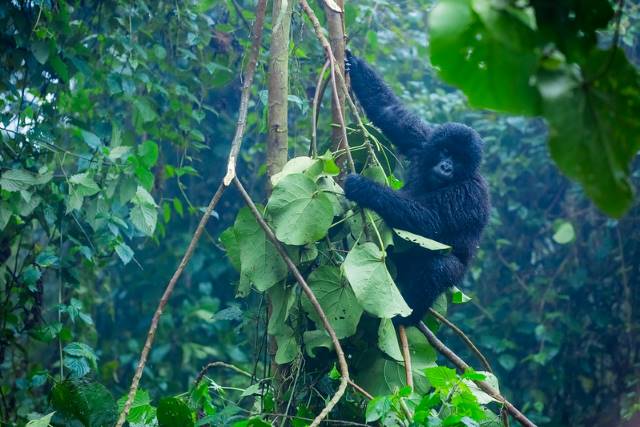Rwanda’s Ecotourism Industry Reduces Poverty
 The Rwandan genocide in 1994 was a national tragedy resulting in an estimated 800,000 deaths in a period of 100 days. However, 27 years after the massacre, the small, landlocked nation of 12 million people is thriving. A mix of social and political factors has contributed to a thriving nation. Rwanda’s ecotourism industry also plays a significant role in alleviating national poverty.
The Rwandan genocide in 1994 was a national tragedy resulting in an estimated 800,000 deaths in a period of 100 days. However, 27 years after the massacre, the small, landlocked nation of 12 million people is thriving. A mix of social and political factors has contributed to a thriving nation. Rwanda’s ecotourism industry also plays a significant role in alleviating national poverty.
A Closer Look at Rwanda
Over the past quarter-century, Rwanda changed its course, moving positively toward economic growth and increased prosperity. According to the World Bank, poverty in Rwanda declined substantially from 2001 to 2017, dropping from 77% to 55%. Since 1994, Rwanda has maintained political stability. Stability allowed the country to develop a cost-free and compulsory primary education system with “one of the highest primary enrollment” rates in sub-Saharan Africa.
The country instituted a universal healthcare program and made great strides in legislative gender equality. In 2019, women made up 61% of Rwanda’s parliament. The percentage of female parliamentary representation is substantially greater than most western democracies. Continued economic and social growth is necessary in order to continue poverty reduction progress.
The Role of Rwanda’s Ecotourism Industry
The International Ecotourism Society (TIES) defines ecotourism as “responsible travel to natural areas that conserves the environment, sustains the well-being of the local people and involves interpretation and education.” Ecotourism can be a tool to unite communities, build environmental awareness and grow underdeveloped economies across the world. Over the past 27 years, Rwanda capitalized on this opportunity and created a growing ecotourism industry.
Tourists flock to Rwanda to wander through hiking trails in the country’s four national parks. Others are drawn specifically to the bamboo forests where visitors can see mountain gorillas, an endangered species, in their natural habitat. According to the United Nations Conference on Trade and Development (UNCTAD), Rwanda is one of the fastest-growing tourist destinations in the world. The tourism sector in Rwanda is “more than 80% nature-based,” indicating that ecotourism forms a substantial part of the tourism sector.
Tourism in Rwanda
Rwanda’s tourism sector experienced its highest annual growth in 2019, netting more than $498 million and attracting an estimated 1.63 million tourists. For the past seven years, “tourism has been ranked as the first foreign currency earner in Rwanda,” contributing 14.9% of Rwanda’s GDP in 2018.
Rwanda’s tourism sector has increased jobs and significantly contributes to the overall growth of the country’s economy. Tourism in Rwanda employs more than 3% of the labor force. For the Rwandan government, tourism is a critical tool for alleviating national poverty, explicit in both policy and poverty reduction strategies. Not only does tourism create jobs but the wealth generated from a booming tourism industry can help facilitate a country like Rwanda in its ability to access clean water, reliable energy and sanitation services.
“Africa’s tourism industry continues to flourish and supports more than 21 million jobs, and for the developing countries, tourism is an enormous tool for sustainable development,” says Mukhisa Kituyi, former secretary-general of UNCTAD.
How COVID-19 Impacts Rwanda
Pre-pandemic, Rwanda was experiencing an economic boom. In 2019, the economy grew by more than 10%, on its way to grow further in 2020. Instead, due to COVID-19, Rwanda’s economy shrank, with a projected decrease in GDP of 0.2%. As a result of COVID-19, the World Bank projected that poverty rates would increase by 5.1%, placing an additional 550,000 Rwandans in poverty in 2021. Overall unemployment rose from 13% in February 2020 to 22% in May 2020 and 60% of workers who remained employed saw significant salary decreases.
As the pandemic forced global recessions and travel restrictions, Rwanda’s ecotourism industry took a major hit. Tourism was expected to decrease by more than 70% worldwide in 2020. Rwanda’s finance minister, Uzziel Ndagijimana, confirmed that in March and April 2020, the tourism industry missed out on roughly $10 million in revenue.
The Road to Rwanda’s Recovery
Since reopening in the summer of 2019, Rwanda’s growing ecotourism industry shows signs of recovery. While international tourism rates are down, domestic tourism rates are up in comparison to past years. According to Rwanda’s leading daily newspaper, The New Times, increased domestic tourism is expected to restore a revenue sharing program where the Rwandan government will redistribute the earnings from domestic tourism to communities living in and around the visited national parks. This policy is likely to enhance the growing ecotourism sector and aid communities that have suffered economically throughout the pandemic.
-Zoe Tzanis
Photo: Flickr
